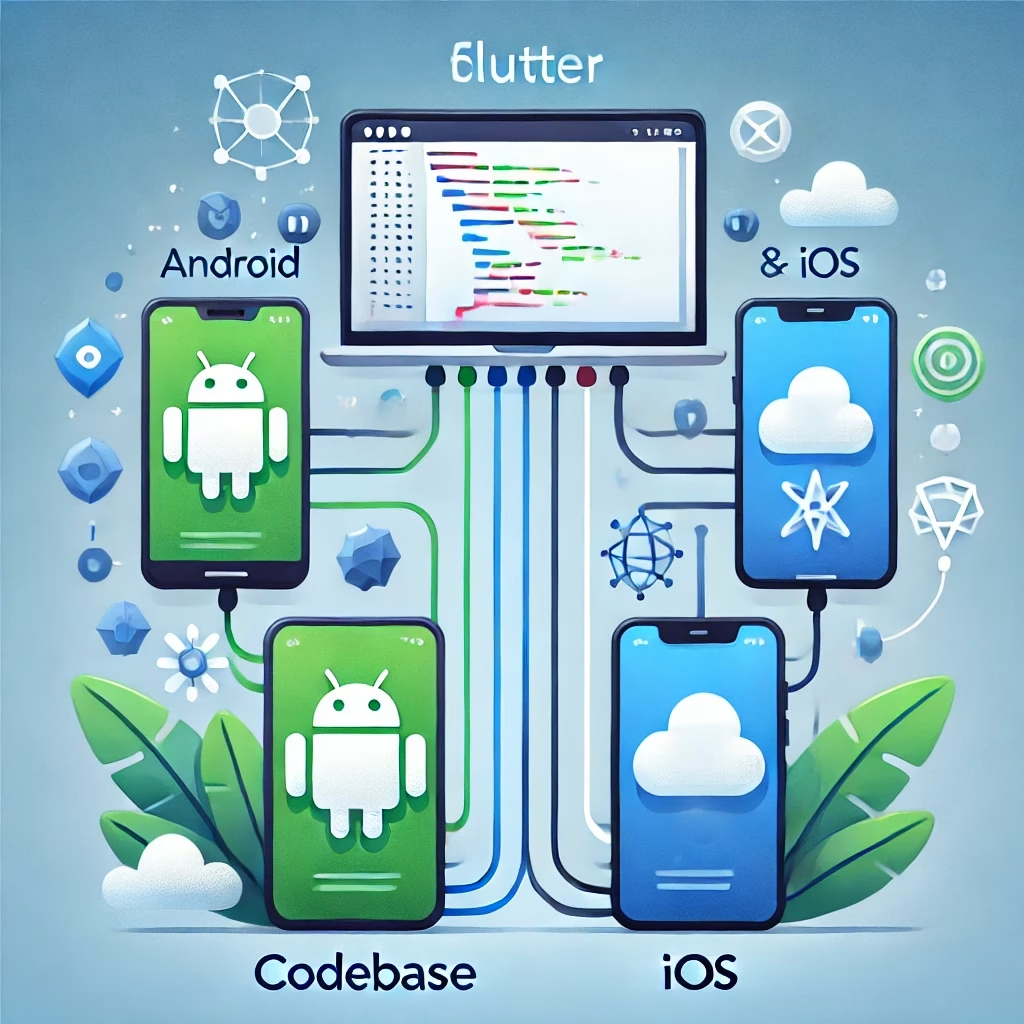Mobile app development has evolved significantly over the years, with various frameworks available to build robust applications. One of the most talked-about frameworks is Flutter, an open-source UI software development kit by Google. It enables developers to build natively compiled applications for mobile, web, and desktop from a single codebase. But when should you choose Flutter for mobile app development? This comprehensive guide will help you determine whether Flutter is the right choice for your project by exploring its advantages, disadvantages, use cases, and comparisons with other frameworks.
What is Flutter?
Flutter is a cross-platform UI toolkit that allows developers to create applications for multiple platforms with a single codebase. It uses the Dart programming language and offers a rich set of pre-designed widgets that help create visually appealing and highly functional applications.
Key Features of Flutter
- Single Codebase: Develop applications for iOS, Android, web, and desktop using one codebase.
- Hot Reload: Allows developers to see real-time changes without restarting the app.
- Rich Widgets: Pre-built customizable widgets for seamless UI design.
- Fast Performance: Uses Skia Graphics Engine for smooth performance.
- Strong Community Support: Backed by Google and a growing developer community.
- Integration with Firebase: Makes backend development easier.
When Should You Choose Flutter for Mobile App Development?
While Flutter is a powerful framework, it may not be suitable for all projects. Here are some situations where Flutter is an ideal choice:
1. Cross-Platform Development Needs
If you need an app that runs on both iOS and Android with a single codebase, Flutter is an excellent option. It eliminates the need to write separate code for different platforms, saving time and reducing costs.
2. Startups and MVP Development
Flutter is perfect for startups looking to develop a Minimum Viable Product (MVP) quickly. It speeds up development, reduces costs, and allows businesses to test their ideas in the market before committing to full-scale development.
3. Rich UI and Custom Animations
If your app requires a visually appealing and highly customized user interface, Flutter’s widget-based approach allows developers to create complex and beautiful UI designs with ease.
4. Performance-Oriented Applications
Flutter apps perform exceptionally well because they are compiled into native ARM code, ensuring smooth animations and faster load times compared to other cross-platform frameworks.
5. Apps with Frequent UI Updates
If you’re developing an app that requires frequent UI updates, such as e-commerce or social media apps, Flutter’s "hot reload" feature allows developers to make quick changes and test them instantly.
6. Budget Constraints
Companies with limited budgets can benefit from Flutter’s cross-platform capabilities, as it reduces the cost of hiring separate teams for iOS and Android development.
7. Integration with Firebase
If your project involves real-time data handling, authentication, or cloud storage, Flutter integrates seamlessly with Firebase, providing a reliable backend solution.
When Not to Use Flutter?
Despite its advantages, Flutter is not always the best choice. Here are some scenarios where it might not be the ideal framework:
1. Apps That Require Heavy Native Functionality
If your app needs deep integration with device hardware (e.g., Bluetooth, GPS, background services), native development (Swift for iOS, Kotlin for Android) might be a better option.
2. Large Applications with Complex Architecture
For enterprise-level applications with intricate architectures and legacy system integrations, Flutter may not be the best fit due to limited third-party libraries and dependencies.
3. Apps with High Memory Usage
Flutter apps can have slightly higher memory consumption compared to native apps, which may impact performance on older or low-end devices.
Pros and Cons of Flutter
Pros:
✅ Faster Development: Code once, deploy everywhere. ✅ Beautiful UI: Customizable widgets for high-quality designs. ✅ Performance: Near-native performance due to direct compilation. ✅ Hot Reload: Instantly see code changes. ✅ Open Source: Free to use with strong community support. ✅ Google Backing: Reliable support and continuous updates.
Cons:
❌ Large App Size: Flutter apps tend to have a larger file size compared to native apps. ❌ Limited Native Features: Some platform-specific functionalities may require additional plugins. ❌ Dart Language Learning Curve: Developers unfamiliar with Dart may take time to adapt. ❌ Limited Third-Party Libraries: Compared to native development, Flutter has fewer libraries.
How Flutter Compares to Other Frameworks
Flutter vs React Native
| Feature | Flutter | React Native |
|---|---|---|
| Language | Dart | JavaScript |
| UI Performance | High | Moderate |
| Development Speed | Fast | Fast |
| Hot Reload | Yes | Yes |
| Community Support | Growing | Strong |
| Native Performance | Better | Good |
Flutter vs Native Development
| Feature | Flutter | Native (Swift/Kotlin) |
| Development Cost | Low | High |
| Performance | Near-Native | Best |
| UI Customization | Excellent | Excellent |
| Access to Native Features | Limited | Full Access |
Conclusion
Flutter is a fantastic choice for mobile app development, particularly for cross-platform applications, MVPs, and visually stunning UI designs. It provides fast development cycles, high performance, and an easy-to-maintain codebase. However, if your app requires deep native functionality or is highly complex, native development might be a better option.
Ultimately, the decision to use Flutter depends on your project requirements, budget, and development timeline. If you are looking for a fast, efficient, and cost-effective solution, Flutter is undoubtedly one of the best frameworks available today.

